Abstract
The cause of alcoholic myocardiopathy is unknown. The effects of acute exposure to ethanol or its metabolite acetaldehyde on protein synthesis in working, intact, guinea pig hearts in vitro were studied utilizing lysine-14C perfusion. Ethanol at 250 mg/100 ml, a level sufficient to markedly inhibit hepatic production of albumin, did not alter cardiac function, the equilibration of the intracellular free lysine pool in either ventricle, or the incorporation of lysine-14C into protein. Thus, in controls and ethanol-perfused hearts, the incorporation of lysine in 3 hr was 44.1±1.5 and 42.8±1.2 μmoles lysine/g protein N for the right ventricles and 25.6±1.0 and 24.3±0.8 for the left ventricles, respectively. Only at lethal levels, 1500 mg/100 ml ethanol, was protein synthesis depressed. Acetaldehyde 3.5 mg/100 ml (0.8 mM) effected a markedly positive chronotropic and inotropic effect on the perfused heart and slightly depressed equilibration of the intracellular free lysine pool. However, determinations of protein incorporation of lysine-14C based on intracellular lysine-14C specific activities showed a significant decrease from control right and left ventricle values, to 27.1±2.8 and 14.9±1.9. Propanalol, which abolished the chronotropic effect, did not prevent the inhibition of protein synthesis. The studies suggest that acetaldehyde, which inhibits cardiac protein synthesis in vitro, may play a role in alcoholic myocardiopathy by interfering with normal myocardial protein synthesis.
Full text
PDF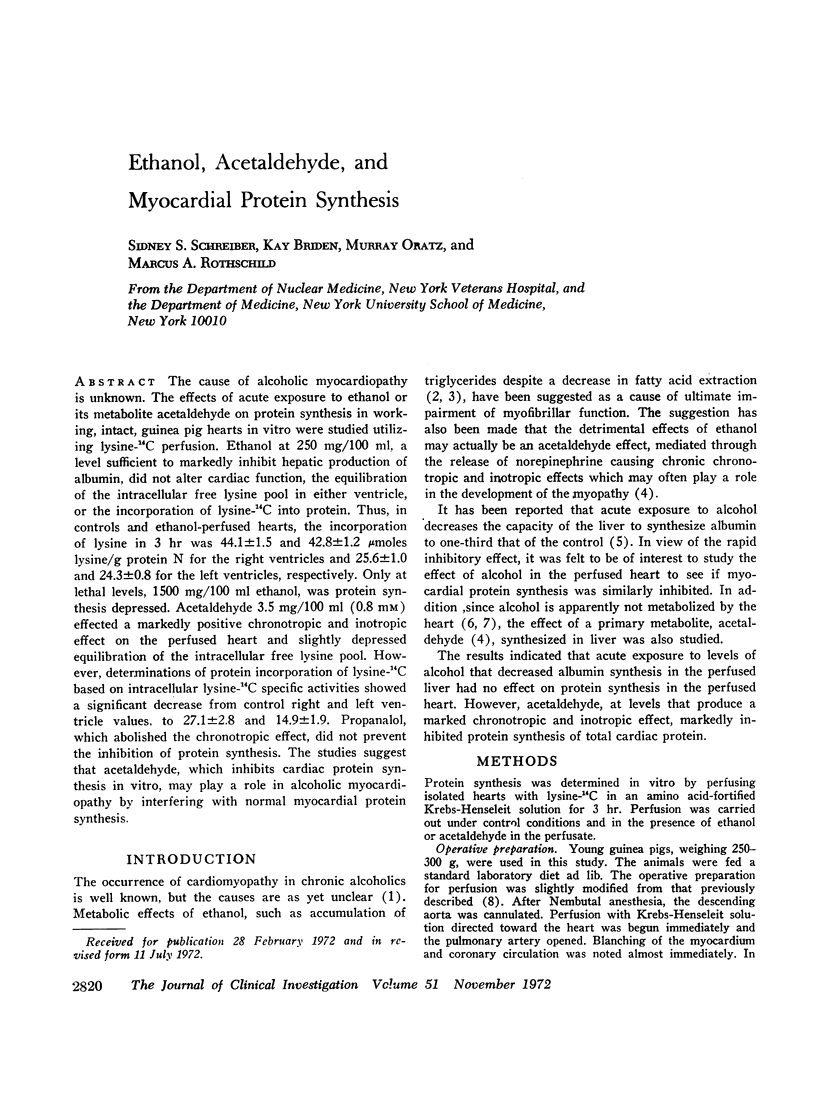
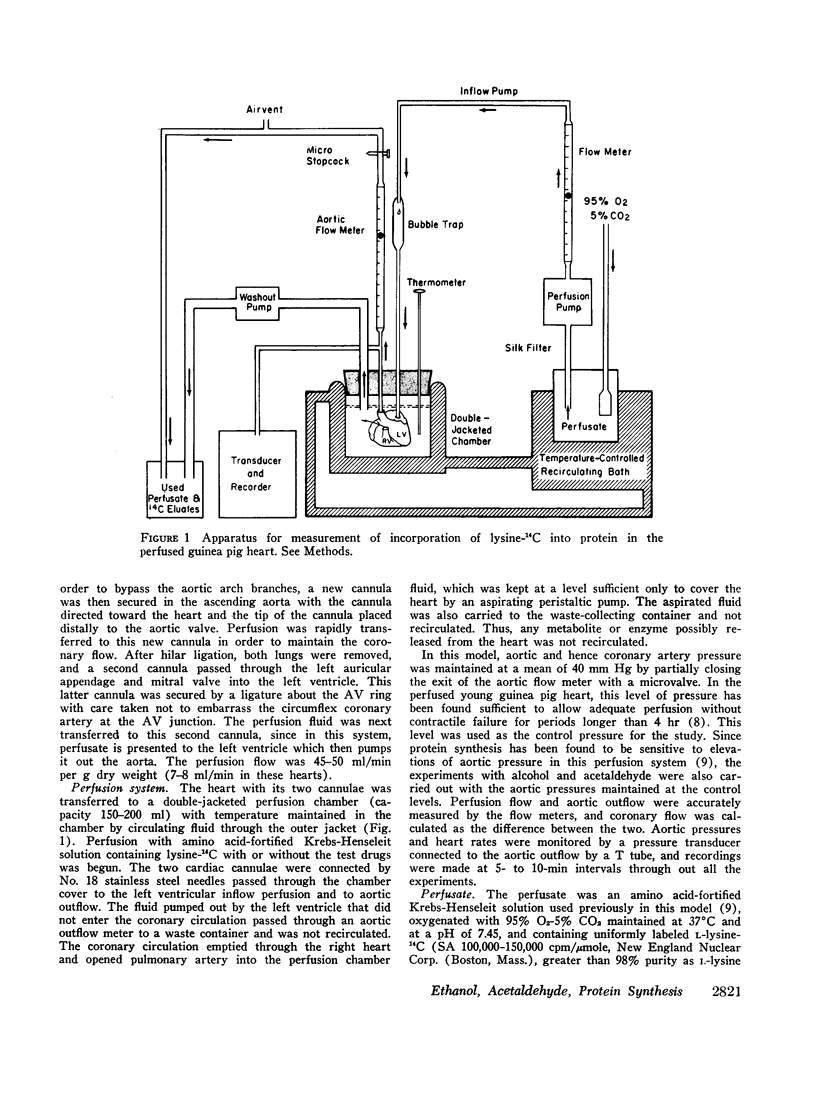
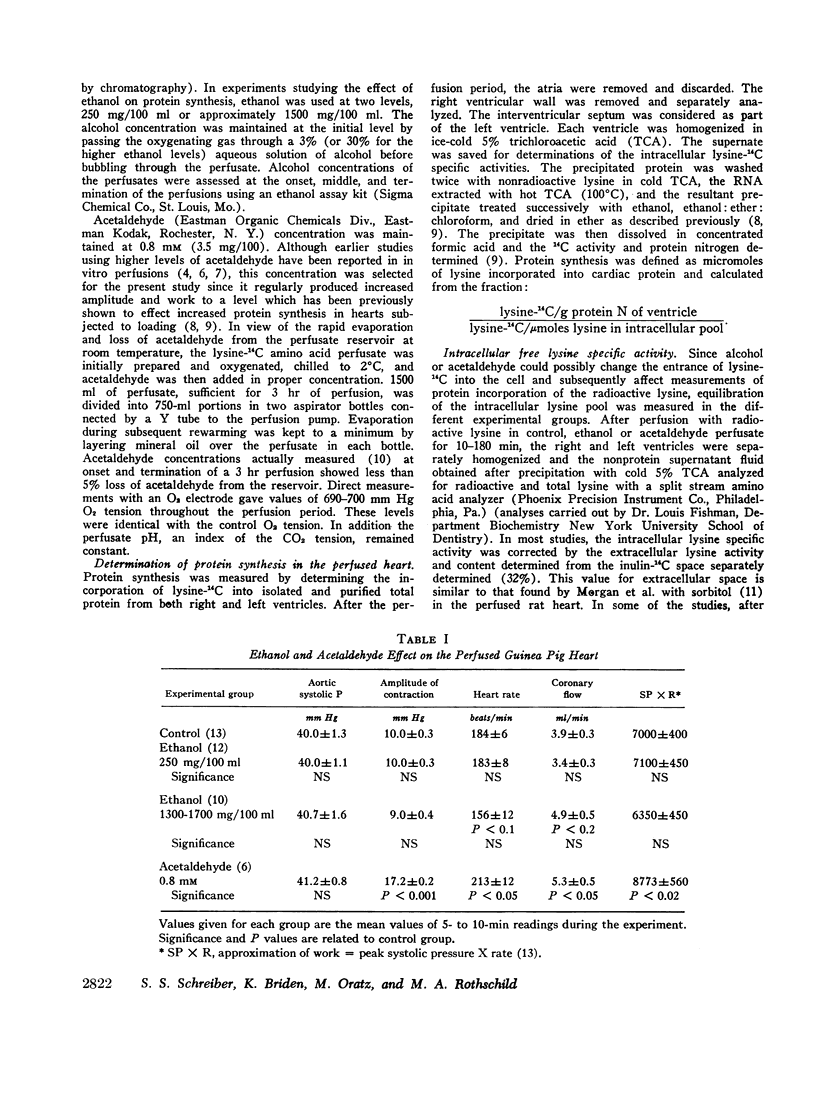
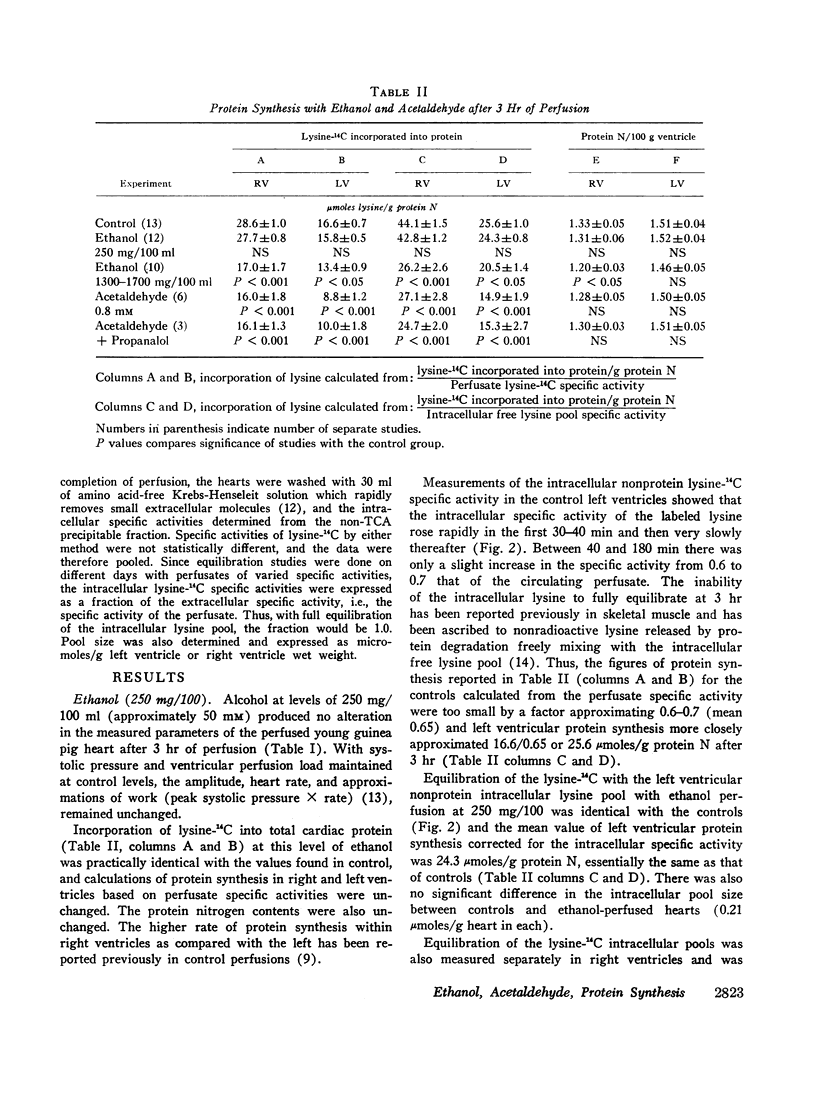
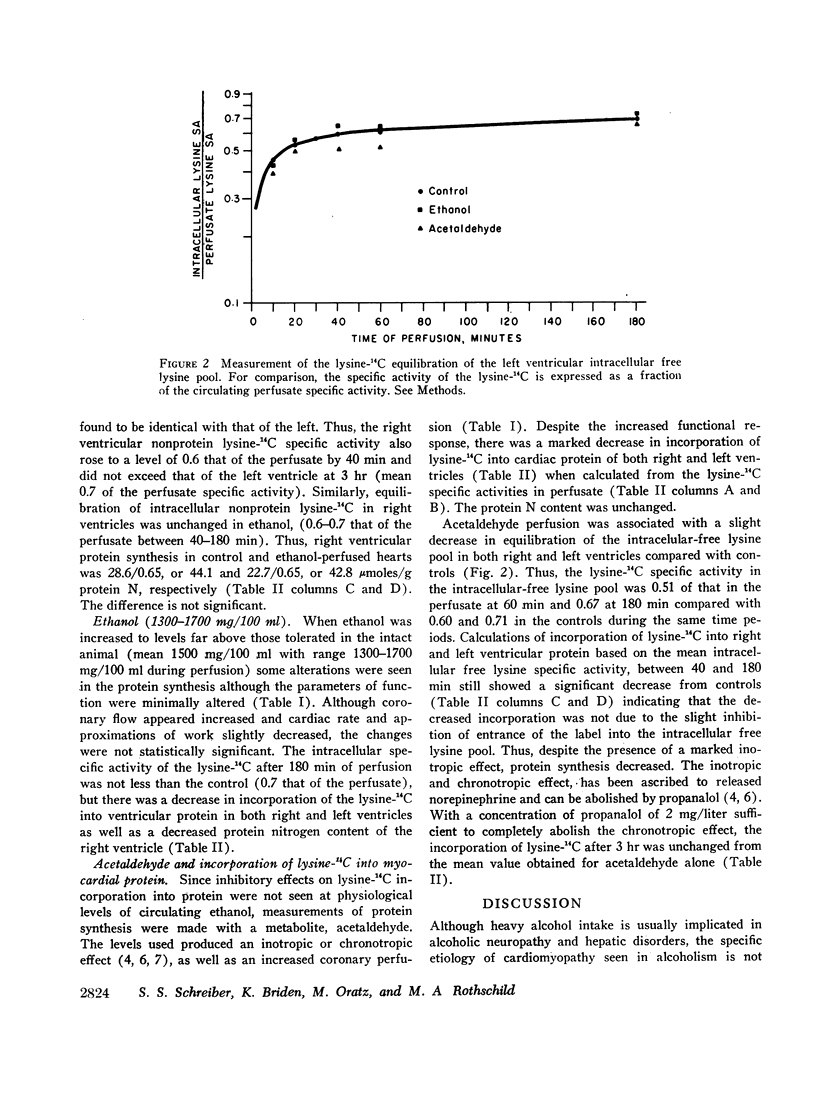
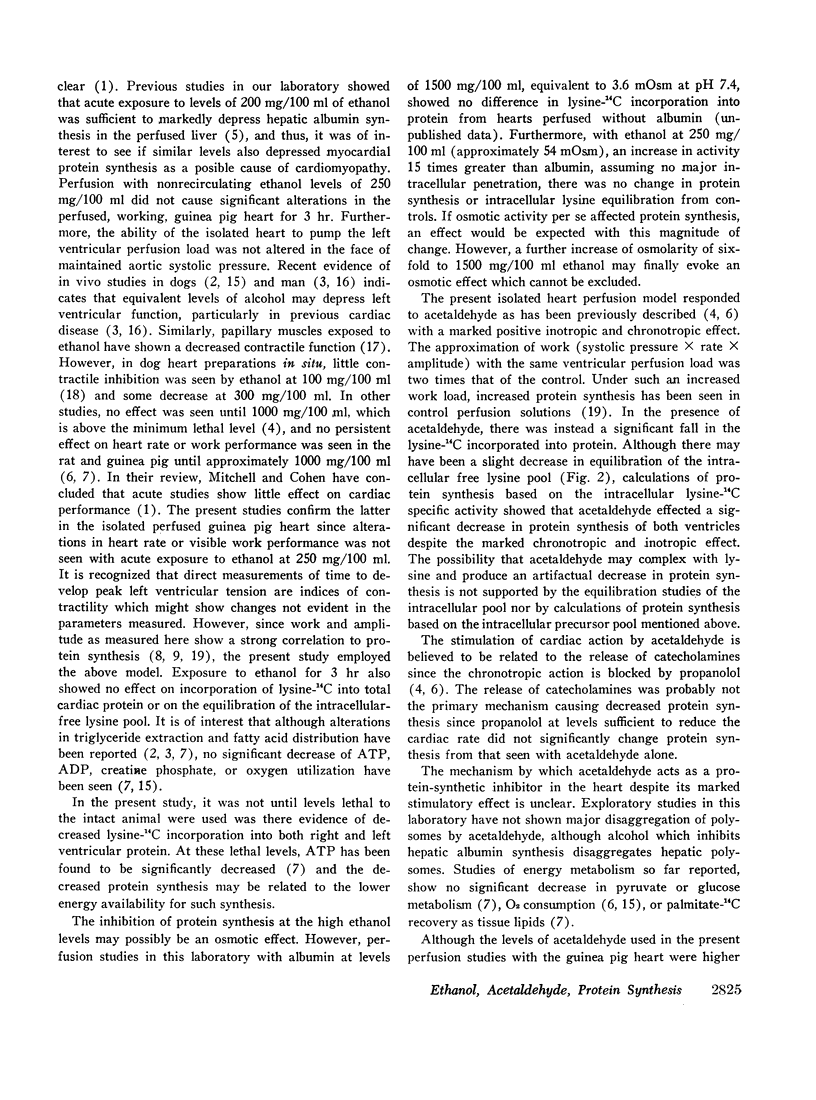
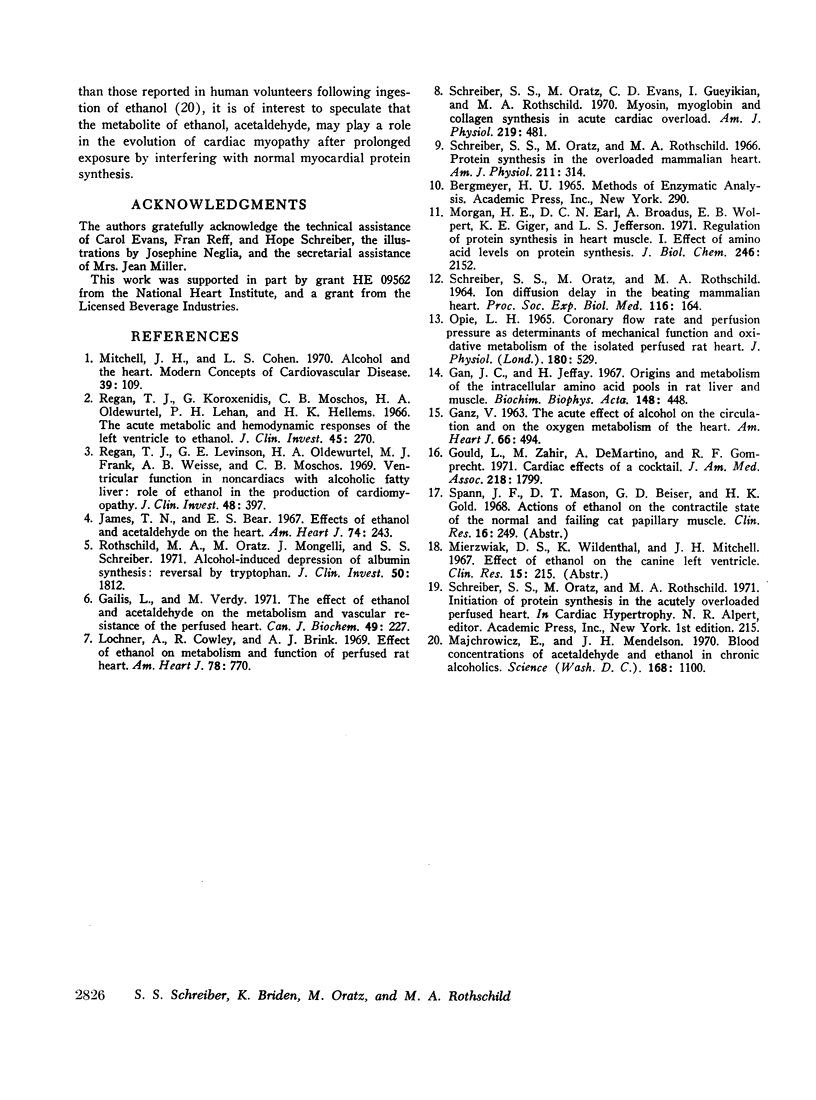
Images in this article
Selected References
These references are in PubMed. This may not be the complete list of references from this article.
- GANZ V. THE ACUTE EFFECT OF ALCOHOL ON THE CIRCULATION AND ON THE OXYGEN METABOLISM OF THE HEART. Am Heart J. 1963 Oct;66:494–497. doi: 10.1016/0002-8703(63)90381-8. [DOI] [PubMed] [Google Scholar]
- Gailis L., Verdy M. The effect of ethanol and acetaldehyde on the metabolism and vascular resistance of the perfused heart. Can J Biochem. 1971 Feb;49(2):227–233. doi: 10.1139/o71-033. [DOI] [PubMed] [Google Scholar]
- Gan J. C., Jeffay H. Origins and metabolism of the intracellular amino acid pools in rat liver and muscle. Biochim Biophys Acta. 1967 Nov 28;148(2):448–459. doi: 10.1016/0304-4165(67)90141-9. [DOI] [PubMed] [Google Scholar]
- Gould L., Zahir M., DeMartino A., Gomprecht R. F. Cardiac effects of a cocktail. JAMA. 1971 Dec 20;218(12):1799–1802. [PubMed] [Google Scholar]
- James T. N., Bear E. S. Effects of ethanol and acetaldehyde on the heart. Am Heart J. 1967 Aug;74(2):243–255. doi: 10.1016/0002-8703(67)90284-0. [DOI] [PubMed] [Google Scholar]
- Lochner A., Cowley R., Brink A. J. Effect of ethanol on metabolism and function of perfused rat heart. Am Heart J. 1969 Dec;78(6):770–780. doi: 10.1016/0002-8703(69)90443-8. [DOI] [PubMed] [Google Scholar]
- Majchrowicz E., Mendelson J. H. Blood concentrations of acetaldehyde and ethanol in chronic alcoholics. Science. 1970 May 29;168(3935):1100–1102. doi: 10.1126/science.168.3935.1100. [DOI] [PubMed] [Google Scholar]
- Mitchell J. H., Cohen L. S. Alcohol and the heart. Mod Concepts Cardiovasc Dis. 1970 Jul;39(7 Suppl):109–113. [PubMed] [Google Scholar]
- Morgan H. E., Earl D. C., Broadus A., Wolpert E. B., Giger K. E., Jefferson L. S. Regulation of protein synthesis in heart muscle. I. Effect of amino acid levels on protein synthesis. J Biol Chem. 1971 Apr 10;246(7):2152–2162. [PubMed] [Google Scholar]
- Opie L. H. Coronary flow rate and perfusion pressure as determinants of mechanical function and oxidative metabolism of isolated perfused rat heart. J Physiol. 1965 Oct;180(3):529–541. doi: 10.1113/jphysiol.1965.sp007715. [DOI] [PMC free article] [PubMed] [Google Scholar]
- Regan R. J., Koroxenidis G., Moschos C. B., Oldewurtel H. A., Lehan P. H., Hellems H. K. The acute metabolic and hemodynamic responses of the left ventricle to ethanol. J Clin Invest. 1966 Feb;45(2):270–280. doi: 10.1172/JCI105340. [DOI] [PMC free article] [PubMed] [Google Scholar]
- Regan T. J., Levinson G. E., Oldewurtel H. A., Frank M. J., Weisse A. B., Moschos C. B. Ventricular function in noncardiacs with alcoholic fatty liver: role of ethanol in the production of cardiomyopathy. J Clin Invest. 1969 Feb;48(2):397–407. doi: 10.1172/JCI105997. [DOI] [PMC free article] [PubMed] [Google Scholar]
- Rothschild M. A., Oratz M., Mongelli J., Schreiber S. S. Alcohol-induced depression of albumin synthesis: reversal by tryptophan. J Clin Invest. 1971 Sep;50(9):1812–1818. doi: 10.1172/JCI106672. [DOI] [PMC free article] [PubMed] [Google Scholar]
- SCHREIBER S. S., ORATZ M., ROTHSCHILD M. A. ION DIFFUSION DELAY IN THE BEATING MAMMALIAN HEART. Proc Soc Exp Biol Med. 1964 May;116:164–167. doi: 10.3181/00379727-116-29190. [DOI] [PubMed] [Google Scholar]
- Schreiber S. S., Oratz M., Evans C. D., Gueyikian I., Rothschild M. A. Myosin, myoglobin, and collagen synthesis in acute cardiac overload. Am J Physiol. 1970 Aug;219(2):481–486. doi: 10.1152/ajplegacy.1970.219.2.481. [DOI] [PubMed] [Google Scholar]
- Schreiber S. S., Oratz M., Rothschild M. A. Protein synthesis in the overloaded mammalian heart. Am J Physiol. 1966 Aug;211(2):314–318. doi: 10.1152/ajplegacy.1966.211.2.314. [DOI] [PubMed] [Google Scholar]



